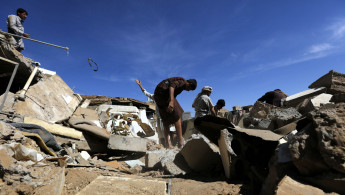Arab coalition troops push toward rebel-held Yemen's capital
As fighting rages on in Yemen, Saudi-led coalition forces are pushing toward the country's rebel-held capital, Sanaa, after securing a strategic provincial city, the commander of an Emirati contingent said Monday.
Fierce fighting was reported between Houthi rebels and coalition forces today around the south-west city of Taiz.
Coalition forces are hoping their campaign will push the rebels out and help restore Yemen's legitimate government.
Emirati Brig. Gen. Ali Saif al-Kaabi told reporters during a visit to an Emirati base inside Yemen that the coalition forces were not "coming to occupy Yemen."
The Emiratis are part of thousands of Saudi and UAE forces fighting on the ground in Yemen to reverse the territorial gains by the rebels known as Houthis, who captured Sanaa last year and much of the country's north. The Saudi-led coalition launched its campaign of airstrikes against the Houthis in March.
The presence of troops from the Gulf states could be a game-changer in the bitter war that pits the Houthis and troops loyal to former President Ali Abdullah Saleh against an array of forces, including southern separatists, local and tribal militias, militants as well as troops loyal to exiled President Abed Rabbo Mansour Hadi.
Pro-government forces recently pushed the Houthis out of several key southern areas in Yemen. The conflict has killed more than 4,000 people, leaving the Arab world's poorest country in the grip of a humanitarian crisis and on the brink of famine.
On Monday, al-Kaabi told media crews during an exclusive visit to UAE troops fighting on the ground in Yemen, that the Saudi-led coalition has secured the city of Marib, the capital of Marib province.
Marib and the southern port city of Aden, from which the rebels were expelled earlier this summer, are the staging ground for the coalition's two-pronged push for Sanaa, added al-Kaabi, who is leading the UAE forces in Marib province.
But while in control of Marib city, about 200 kilometers (125 miles) west of Sanaa, the Emirati troops face a difficult terrain of towering mountains between them and the Yemeni capital, said the Emirati commander.
Al-Kaabi compared the area to the terrain in some parts of Afghanistan, where Emirati forces contributed to the US-led coalition. The mountainous region, he said, has also been peppered with land mines planted by the Houthis and Saleh's loyalists.
An Emirati soldier was killed by one such land mine on Monday, the second to die in as many days, bringing the death toll for Emirati forces in Yemen to 54, when a missile hit their sprawling Forward Operating Base Saffer.
At least 10 soldiers from Saudi Arabia and five from Bahrain also were killed in that attack.
But instead of breaking the coalition's will, the September missile assault prompted the US-backed alliance to intensify what has effectively become a proxy war against Iran.
"We won't forget our blood," al-Kaabi said of the attack earlier this month, which killed 52 UAE soldiers. It was the heaviest military loss for the Emirates since the Gulf country was founded in 1971. "This is a personal thing for the soldiers."
The Emiratis subsequently deployed Patriot missile batteries to the base, to prevent a similar attack by the Houthis. At the large and well-established base, there are also dozens of American-made armored fighting vehicles, Blackhawk helicopters and French-made tanks.
Before the September attack, coalition countries avoided acknowledging they had ground troops in the impoverished Arabian Peninsula country, while Yemeni security officials said that Saudi, Emirati, Egyptian and Jordanian military advisers were training hundreds of fighters at a military base in Aden.
The Saudis also are supplying weapons and providing military advice in the fight for control of their southern neighbor, the Yemenis have said.
Taking the small Marib provincial capital was important and strategic, al-Kaabi added, because "if you want to go to Sanaa, you need to get to Marib, it's the last line."
Now, the "city is in our hands," he said. "The enemy is in the mountains."





 Follow the Middle East's top stories in English at The New Arab on Google News
Follow the Middle East's top stories in English at The New Arab on Google News
![Netanyahu furiously denounced the ICC [Getty]](/sites/default/files/styles/image_330x185/public/2024-11/GettyImages-2169352575.jpg?h=199d8c1f&itok=-vRiruf5)
![Both Hamas and the Palestinian Authority welcomed the ICC arrest warrants [Getty]](/sites/default/files/styles/image_330x185/public/2024-11/GettyImages-2178351173.jpg?h=199d8c1f&itok=TV858iVg)
